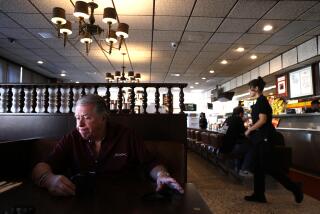Village Vendor : Sidewalk Hot Dog Business Is Cooking, but New Law Could Cool It With Higher Fees, Restrictions
- Share via
In another era, Norman Rockwell would have painted Chuck Burt.
A truck driver, forced from the cab of his big rig because of failing eyesight and hearing, Burt now pushes a different kind of vehicle--a cart filled with steaming hot dogs. He has become a noontime fixture in Uptown Whittier, building a steady clientele who buy beef wieners with all the fixings for $1.25. Looking like he just stepped from an old magazine cover, Burt shuffles along the sidewalks wearing a baseball cap and calling customers “handsome” and “gorgeous.”
He smiles a lot these days because business is good, but that has brought problems. The competition, Burt says, wants to clamp down on him.
Some Uptown merchants say street vendors like Burt operate at a distinct advantage. They contend that vendors--unlike those with fixed businesses--pay nothing to maintain the quaint shopping district, yet they profit from its village-like ambiance, which often draws sizeable crowds at lunchtime.
An ordinance before the Whittier City Council would change all that. The annual city fees for vendors in Uptown would jump from about $30 to $225, and the way Burt figures it, “that’s a lot of polish sausages.” The ordinance, initiated by the Whittier Uptown Assn., also would require vendors to move at least 500 feet every 15 minutes, and all vendors would be fingerprinted. The law would allow police to do background checks on vendors and peddlers who apply for a city business license. The council will consider the ordinance for a third time Tuesday night.
Officials of the Uptown association say all merchants are assessed several hundred dollars a year to keep the village with its brick crosswalks, benches and gas lights looking fit and polis1751475246different. And the fingerprints, they add, are just a precaution to keep unwanted transients with shady pasts from pushing Popsicles or hot pretzels from carts on Uptown sidewalks.
Opponents of the ordinance say the Uptown association’s true mission is not to curb vendors but to eliminate them altogether. At one time that was the case, the association president told the council recently. But no more, Lane Langford said.
About a half-dozen street vendors work the Uptown area, police say. But with summer approaching, city officials said they are concerned about reports from other cities of big-time operators, who move into a community and deploy several dozen vendors at once. Said 1281453671their numbers.”
The 57-year-old Burt does not see it that way.
“There are a couple of restaurant owners around here that would just as soon see me gone,” he said, adding with some relish, “maybe they’re jealous . . . maybe I cost them a customer or two.”
Burt said the new ordinance probably will not put him out of business, but “it’s going to make it rough . . . “
There is little doubt that Burt has a faithful following of hot dog fanciers, who are unhappy with the city’s plan to take a bigger bite out his business. While city officials say the new ordinance is not directly aimed at Burt, his followers are taking this personally and rallying around his cart.
At a recent council meeting, one little girl waited nearly four hours to tell the city fathers how much she loved Burt. “He talks to us nice, and makes us laugh,” she said, the top of her head barely visible over the podium. “Burt is our friend. Don’t put him out of business.”
One Uptown businessman, upset about the pickle Burt is in, testified that the chatty vendor is a healthy alternative to the village’s “smoky, overpriced restaurants.”
About 100 people even signed a petition on Burt’s behalf urging the council not to change the street vending law. The petition said Burt is a “godsend” for shopping mothers and hurried bank employees who have only minutes for lunch.
Burt swapped his 18-wheeler for a four-wheel hot dog cart about a year ago when he could not renew his license to drive the big trucks on cross-country deliveries. His hearing was failing and his eyes were also giving him fits, he said.
Still able-bodied, he wanted to continue working, at least part time, to supplement his disability checks, so he started selling hot dogs.
Most weekdays, he starts his route in front of Whittier High School about 11 a.m., selling to students and staff, before pushing slowly up Philadelphia Street to Uptown Whittier.
Proud of his all-beef product, he boasts that he never has to push his hot dogs, “they just sell themselves.” For an extra two bits, they come with sauerkraut or chili. By mid-afternoon he turns his cart around and heads home to his wife, Patricia Ann.
He won’t say how many hot dogs he sells. “I make enough to keep the bill collectors away,” he said.
But passage of the new vending ordinance with its higher fees might change that, he said. He thinks the city ought to reconsider.
“A lot of people tell me that I add a lot to the village area,” Burt said. “Maybe they should pay me to sell here.”
More to Read
Sign up for Essential California
The most important California stories and recommendations in your inbox every morning.
You may occasionally receive promotional content from the Los Angeles Times.










